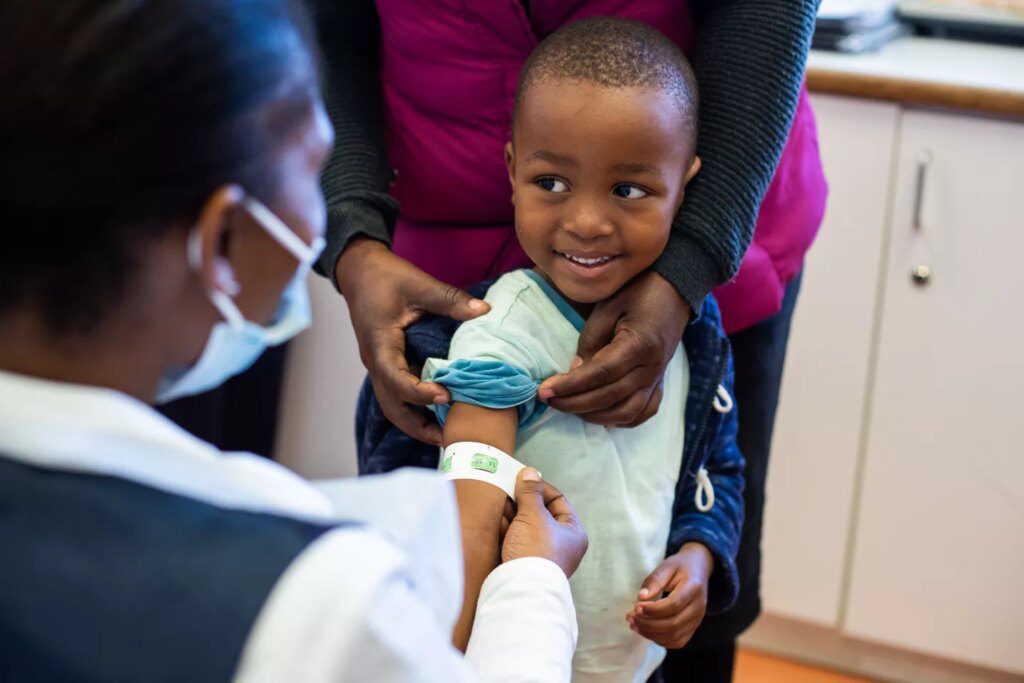PRETORIA, 6 June 2024 – A new UNICEF report reveals that South Africa is one of 20 countries that account for 65 per cent of all children living in severe child food poverty globally. Of particular concern, is that 23 percent of children in South Africa are classified in that category and are at risk of life-threatening malnutrition and related health complications.
The Child Food Poverty: Nutrition Deprivation in Early Childhood report analyses the impacts and causes of dietary deprivation among the world’s youngest children in nearly 100 countries, and across income groups. It warns that millions of children under the age of five are unable to access and consume a nutritious and diverse diet to sustain optimal growth and development in early childhood and beyond.
“The consequences of severe child food poverty can last a lifetime,” said Christine Muhigana, UNICEF South Africa Representative. “Malnutrition in all its forms weakens immune systems and increases children’s risk of dying from common childhood diseases. Children’s brain development is also impacted in the early years of life, affecting their ability to learn and leading to lifelong development challenges that can perpetuate the cycle of poverty,” added Muhigana.
The report warns that while countries are still recovering from the socio-economic impacts of the COVID-19 pandemic, the effects of growing inequities, conflicts, and the climate crisis have pushed food prices and the cost of living to record high levels.
Several factors are fueling the child food poverty crisis, in South Africa and globally, including food systems that fail to provide children with nutritious, safe and accessible options, families’ unable to afford nutritious foods, and parent’s inability to adopt and sustain positive child feeding practices.
“Tackling severe child food poverty requires a commitment to transform food systems so that nutritious, diverse and healthy foods are the most accessible, affordable and desirable options for feeding young children,” added Muhigana.
In parts of South Africa, such as the Eastern Cape, insufficient access to nutritious food is compounded by a lack of access to safe water and sanitation, as well as housing that is easily damaged due to extreme weather and can result in displacement.
“There are some days where we go to bed hungry, my child will say ‘Mama I’m hungry’”, Ntombizoxolo, an unemployed mother of two told UNICEF during a recent visit to families in Cwebeni village, Eastern Cape. “This torments me inside because I know how much hunger affects me as an adult, so how much more for them,” added Ntombizoxolo.
She showed the limited diversity of food in her home, which often runs out by the middle of the month, and explained how her children struggle to cope with school. Local NGOs, like Ithemba Kuluntu, do extraordinary work in her village to provide nutritious food three times a week. UNICEF alongside government and other partners are working to improve food systems, while strengthening access to quality community level health and nutrition services, but much more needs to be done to break the cycle of malnutrition.
Child nutrition issues are also compounded in South Africa and other countries by easier access to cheap, nutrient-poor, and unhealthy ultra-processed foods and sugar-sweetened beverages that are aggressively marketed. These unhealthy foods and beverages are consumed by an alarming proportion of young children experiencing food poverty and displace more nutritious and healthier foods from their daily diets.
To end child food poverty, UNICEF calls on governments, development and humanitarian organizations, donors, civil society and the food and beverage industry to urgently:
Transform food systems so that nutritious, diverse and healthy foods are the most accessible, affordable and desirable option for caregivers to feed young children.Leverage health systems to deliver essential nutrition services to prevent and treat malnutrition in early childhood, including support for community health and nutrition workers to counsel parents and families on child feeding and care practices.Finalize and put into law the draft regulations for the ‘Labelling and Advertising of Foodstuffs in South Africa’, which include key actions such as front-of-pack labelling and the restriction of advertising of unhealthy foods to children.Ensure that every eligible household in South Africa receives the Child Support Grant to help meet their children’s basic needs.
The report finds nearly half (46 per cent) of all cases of severe child food poverty are among poor households where income poverty is likely to be a major driver, while 54 per cent – or 97 million children – live in relatively wealthier households, among whom poor food environments and feeding practices are the main drivers of food poverty in early childhood.
Source link : https://www.unicef.org/southafrica/press-releases/23-cent-children-south-africa-live-severe-child-food-poverty
Author :
Publish date : 2024-06-06 04:58:33
Copyright for syndicated content belongs to the linked Source.
